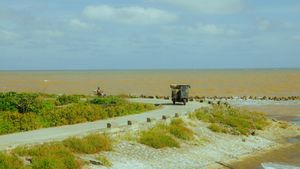World leaders are preparing to converge for the UN's COP29 climate summit beginning on November 11, 2024, with high hopes and urgent objectives set against the backdrop of Azerbaijan's capital, Baku. This year's summit, touted as the "finance COP," is expected to tackle pressing issues such as climate finance, emissions reductions, and support for developing nations grappling with climate-related disasters.
President Ramchandra Paudel of Nepal is among the delegates representing their countries at the conference. His presence follows an invitation from Azerbaijani President Ilham Aliyev, and he is set to address the 'World Leaders Climate Action Summit' on November 12, underlining Nepal's commitment to global climate action.
With approximately 40,000 participants anticipated, including diplomats, scientists, activists, and business leaders from nearly 200 nations, COP29 faces scrutiny due to the notable absence of key world leaders. Notably, US President Joe Biden, whose participation could significantly influence climate discussions, has opted out following Donald Trump’s surprising election victory. This absence signals potential shifts back to more skeptical US policies on climate change.
"Billions of people are counting on us to deliver climate finance at a scale adequate to the urgency and scale of the problem," remarked COP29 President-designate Mukhtar Babayev, emphasizing the significance of the summit.
This year's gathering holds added importance as it aims to address what Punta Gorda's Mayor recognizes as the "crucial question" of climate finance. Developing countries are insisting on guarantees of financial support from wealthier nations to help them mitigate greenhouse gas emissions and adapt to the realities of climate change.
Despite the challenges, the agenda for COP29 remains ambitious, prioritizing the establishment of new annual climate finance targets and operationalizing multilateral carbon credit markets.
The opening ceremony of COP29 is expected to draw about 100 national leaders, but as news reports indicate, significant figures will be missing. European Commission President Ursula von der Leyen is unable to attend, and German Chancellor Olaf Scholz cited internal political issues, including coalition turmoil. Likewise, French President Emmanuel Macron and Brazilian President Luiz Lula da Silva have chosen not to participate, raising alarm among climate advocates eager for international consensus.
For many smaller nations vulnerable to climate impacts, the low attendance from major powers is frustrating. Countries like Papua New Guinea have expressed disillusionment, perceiving this summit as less of a priority for the larger nations.
The potential impact of the upcoming US climate policy shift under Trump is troubling for many. Climate advocates have labeled this period as particularly pivotal for urgent global action. Manish Bapna, president of the Natural Resources Defense Council, commented on the significance of COP29, stating, "The U.S. has a key role to play, but the outcomes from this election suggest more uncertainty going forward."
Another key figure at the summit will be Sultan Al Jaber, the UAE's Minister of Industry and Advanced Technology, who oversaw last year's COP28. Al Jaber has garnered attention for his role at COP28, where nations made groundbreaking agreements concerning the transition away from fossil fuels. His influence continues to be felt as COP29 negotiations proceed.
Azerbaijan’s hosting of COP29 has drawn attention not only for its strategic role but also for its efforts to showcase advances in renewable energy and address its environmental challenges. Agrarian nations worldwide look this week to Azerbaijan for substantive commitments amid widespread skepticism following previous negotiations.
This year’s discussions are particularly pressing as the ramifications of climate change become ever more dire. Unveiling data from the United Nations, climate authorities reported dire projections if current greenhouse gas trends persist. More extreme weather instances, rising sea levels, and loss of biodiversity threaten the fabric of global ecosystems.
Indeed, the stakes at COP29 are high. Members of delegations are tasked with pushing the global agenda forward amid rising tensions and increasing skepticism about the efficacy of prior climate agreements. Local protests and calls for accountability may echo through Baku as participants gather to negotiate the future of climate action.
There’s still hope, though. More than ever, climate-vulnerable nations are advocating for their rights to financial aid and technological support to adapt to their pressing scenarios. The outcomes of COP29 could set the course for climate justice and equity moving forward, enabling cooperation and building relationships among diverse nations.
Despite previous mishaps and shifting political winds, COP29 offers the opportunity for renewed commitments and action. The focus now lies on whether COP29 can effectively address the issues at stake and deliver the necessary results to combat the global climate emergency.



